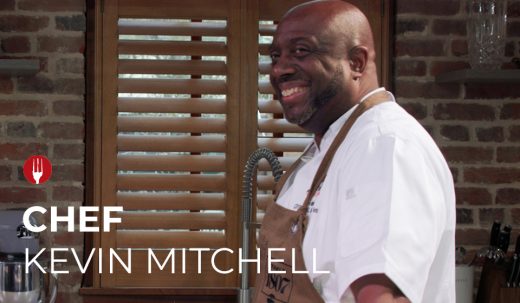
In honor of Black History Month, Chef Works had the chance to chat with Chef Kevin Mitchell, also known as the ChefScholar. Hit play, or keep reading to learn five things about him!
He first learned how to cook from his grandmother.
“My grandmother would let my brothers go outside and play, and she would make me stay in the house and teach me how to cook and how to iron at six years old. One day, I asked my grandmother, ‘Hey, how come I can’t go outside and play and do all the things that my brothers are doing?’
She sat me down and said, ‘One day I’m not going to be here, your mother’s not going to be here, to cook your meals and do your laundry. So you need to know how to do those things.’ And my response was, ‘Well, what about the other three out there that are outside, running around and playing? They don’t need to know that?’ So I really believe that at that age for her, she saw something in me which led me into the culinary industry.
I remember at 7 years old, I was watching a television program about the Culinary Olympics. I remember seeing these gentlemen in these crisp white jackets and tall white hats, and they’re putting together these beautiful elaborate platters of food. I was extremely enamored by it. But the one thing I really remember was the fact that there was no one on that program that looked like me. I remember running into my grandmother’s room and saying, ‘Grandma, I know what I want to be when I grow up.’”
Chef Mitchell was the first Black chef instructor at the Culinary Institute of Charleston.
“I think I’m making a huge powerful impact just by walking in the door. I don’t even have to speak. At the time a little over 40% of our students were African American, and for them to finally see an African American in a position of power, a position of a faculty member, was very impactful on those students, and it still holds true today.”
Thousands follow his Instagram page (@chefscholar) to explore the intersection of food and history.
“When I decided to leave Charleston to get my graduate degree at the University of Mississippi, I decided that I was going to create this Instagram page. What I wanted to do was have people see me as a chef and then follow me on my journey into becoming a scholar… I figured that if my students were watching this page, they were coming on this journey with me and they were learning the same things I was learning.”
Chef Mitchell’s book — Taste the State: South Carolina’s Signature Foods, Recipes, and Their Stories — started with a compelling idea for a dinner party.
“The book came from my co-author, Dr. David Shields. He and I have been colleagues since 2014, and we met through a mutual friend who was given the story of a formerly enslaved chef here in Charleston. His name was Nat Fuller.
David found some research about Nat Fuller and why he was important to the culinary landscape in this area. He was able to get into a work-for-hire agreement with his former slave owner who actually bankrolled a restaurant. So Nat opened a restaurant here in Charleston, and his major claim to fame was about two weeks after the Civil War ended.
He hosted what they called then a miscegenation dinner — basically a mixed-race dinner where Blacks and whites broke bread in the same room at the same time, in the spirit of equality and in the spirit of reconciliation. And David had in his mind that we should recreate that dinner 150 years later.”
For Chef Mitchell, Black history isn’t just a month — it’s an evergreen subject to explore everyday.
“When we talk about slavery, we talk about the atrocities, which we should always address head-on. But I wanted to share other stories. I wanted to share stories of perseverance, I wanted to share stories of knowledge.
A lot of the time, we talk about how slaves were not allowed to learn how to read and write. But these enslaved cooks, formerly enslaved cooks, and freed cooks — they knew how to write. They needed to know how to deal with money, because they would actually go and purchase goods to bring back to the big house for the mistress to sign off. The importance for me is to show those stories along with what we always talk about.”


